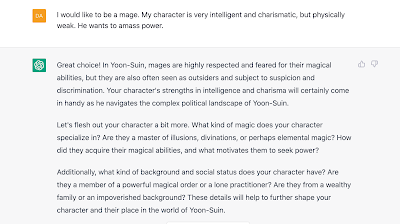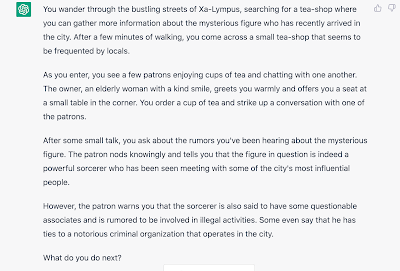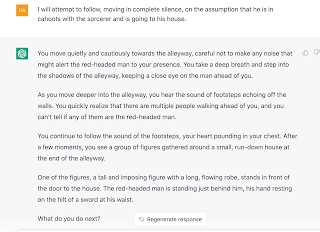The tournament has fallen into abeyance as dawn spills across the sky in pale brightness; some of the gods have run, cackling and whooping, down to the river to wash themselves of the aftermath of Hexaich's exuberance. Others have gone back to the citadel for more brandy, more wine, more arak. Still others loll about on the grass, savouring the cool freshness of the dew. It is already warm, and the day promises to be hot indeed.
The Skurtch is impatient. Scratching his belly and chewing on a lamb cutlet he has somehow found, he beckons the Droll Knave. 'I grow dissatisfied. Let us recommence.' The Droll Knave nods, and others with him - Lap-Laz, the Snem, the Quiet Leaper - murmur approval. Their calls go out, echoing through the trees: 'Return! Return! The tournament begins again! Return!' And soon the gods are flocking back to the purple blanket, waddling dripping from the river or bearing amphora from the citadel gate.
Gathered in place once more they wait in a hubbub to see who will emerge for the fight. Eventually Collequette, the Indigent, edges forward. Draped in black and brown rags, her thin face etched with lines and patinated with dirt, she whispers, 'I have little, but what I have, I will offer.' Kneeling briefly, she waves her arm before her in a flourish, as if casting out a handful of salt or sand. What look like small scraps of crumpled black paper unfurl in mid-air and reveal themselves to be bats, fifteen of them, flapping frantically and wheeling about like fragments of rubbish whipped up by a storm.
Opposite her now stands Vwaik, the Sherbet-Eater. Thin, graceful, effete, his florid robes a mess of ribbons and sashes, he always conveys the impression that in his own mind he inhabits his finest hour. But he is old now, and bald, and his skin is sallow and blemished. From a very long black sleeve, lined inside with cherry red, he produces his champions - eight halflings, bearing short bows and equipped with smart-looking leather armour and brightly polished helmets. They nod to one another in reassurance as they march forward across the purple.
'Ah, a bout for the purists, is it not?' calls out the Droll Knave, and a snigger goes up among the crowd.
'I for one have a taste for this type of ingenuous digression,' says Lap-Laz. 'Honest fare of the type that was once common, but now lamentably out of fashion!'
There are some nods of agreement. But Hexaich expresses her verdict after a loud belch: 'At least it will be over quickly.'
For the participants, though, the focus is already on the battle. The bats swoop forward and the halflings immediately loose a volley of arrows. But, perhaps overawed by the crowd around them, their shots are wild. Only one bat is struck from the air. And then the beasts are screechingly upon them, biting and clawing - a whirlwind of flapping wings, sharp fangs, tiny malevolent eyes sparkling with the lust for blood. Four halflings lie dead on the blanket as the bats wheel away.
'"Quickly" was an understatement!' shouts the Skurtch. But the bats must come around for another pass, exposing themselves to more arrows. Volleys are fired. Once! Twice! Each time another bat dies, plummeting down to expire on the purple in a tangle of broken wings and snapped wood. But then the remaining bats are on the halflings again, swooping down for the kill. The gods lurch to their feet to watch the slaughter; they bray and cheer and punch the air as another three halflings fall torn and bloody to move no more.
Just one wounded hairfoot remains, an arrow knocked to his bow. The gods howl with laughter. 'Is this what we came back for? Is this what we gave up our swimming to see?'
'Sherbet-Eater!' Lap-Laz's voice rises above that of the throng. 'You are doing this by half-measures!'
'Not half!' cackles Ya-Besh.
Vwaik wrinkles his upper lip. 'Do your worst,' he hisses to his last champion. The halfling draws his bow, takes careful aim, tracks a target through the air - and shoots wide. As the deadly flock circles back to his position he fires again - again to no effect. Vwaik does not wait to see the outcome. With a single stamp he crushes the life from his champion, and stalks off towards the river, leaving the small broken body oozing and twitching on the blanket.
The rest of the gods glance at each other and shake their heads. 'Poor show,' says the Snem. 'He was always that way, even as a child,' says Cacomantis.
But Collequette at least is pleased. She beckons her bats to her, and catches them with a single sweeping and surprisingly graceful motion of her bony hand.




















